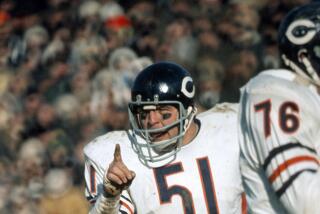Jerry Sandusky trial: As case winds down, a look at the details
The Jerry Sandusky trial is moving to its conclusion with the jury expected to begin deliberations Thursday after the prosecution and defense summarize their cases. Here is a primer into the case that shook up Penn State University and the world of big-time college athletics.
Who is Jerry Sandusky?
Sandusky, 68, is the retired assistant football coach at Penn State University who also founded the Second Mile, a charity for at-risk children, in 1977. He was arrested last year and charged with sexually abusing 10 boys connected to the charity during a 15-year period. Witnesses testified in court that some of the alleged acts took place in Sandusky’s home in State College, Pa., and some in the locker room showers of the football training facility of the university.
Why did the Sandusky case gain national attention?
The Sandusky arrest touched off a firestorm at Penn State, among the nation’s leading schools and a football powerhouse. Questions quickly focused on when college officials found out about reports of Sandusky’s abuse, and what they did afterward. University trustees dismissed head football coach Joe Paterno and President Graham Spanier for not acting forcefully enough on the reports. Two other college administrators await trial on charges stemming from the investigation.
PHOTOS: Who’s who in the Sandusky case
What is Sandusky charged with and what does he face if convicted?
Sandusky is charged with 51 criminal counts, including 11 counts of involuntary deviate sexual intercourse, the most serious charge, which carries a maximum sentence of 20 years in prison and a fine of $25,000 for each count. Sandusky could be sentenced to hundreds of years in prison and hundreds of thousands of dollars in fines if convicted on those counts alone. But even convictions on some of the other counts could put him in prison for the rest of his life.
What is the prosecution’s case?
The prosecution’s case is based on the testimony of eight men who said Sandusky sexually abused them as children. In four days of graphic and vivid description, the men said the former football coach made them feel special and gave them gifts, including trips to football games and sports memorabilia. Then he forced them to engage in sex acts and inappropriate touching, they said.
The identities of two of the boys have never been ascertained. But prosecutors presented adults who said they knew of the abuse. One of those adults is Mike McQueary, a former Penn State football player, who testified that he saw Sandusky in a shower with a boy, 10 to 12 years old, committing a sex act in 2001. The next day, McQueary went to Paterno who went to other university officials.
What is the defense case?
The defense rests on a tripod of arguments.
First, the defense called to the witness stand friends, neighbors and former colleagues who testified that Sandusky had a sterling character, loved to help children in distress and was never seen abusing any boy. Those witnesses included Sandusky’s wife, Dottie, who was with her husband and some of the accusers at the time the abuse was alleged to have taken place. She specifically denied two accounts, one from a boy who said he screamed for help while he was being abused in the basement of the Sandusky home and the other from an accuser who said he was abused in a hotel room on a trip to see the Alamo Bowl football game.
The defense also argued that the quality of the investigation was poor and the witness accounts were riddled with errors. For example, McQueary initially got the date of the encounter wrong and had to amend it in later. Furthermore, investigators gave details of some of the cases to other prospective witness, in effect allowing them to coordinate their stories, the defense maintained. The implication was that the accusers acted together to increase the likelihood of a big pay day from expected civil suits.
Finally, the defense argued that Sandusky was suffering from histrionic personality disorder, which explained the overly dramatic gifts of trips and love notes. The prosecution argued that the gifts were examples of grooming by a predatory pedophile.
What has Sandusky said?
Sandusky did not testify in his own defense, even though his lawyers earlier had hinted that he might.
In interviews after the charges were filed, Sandusky appeared to have a hard time dealing with questions, pausing and creating an impression of indecision when sports journalist Bob Costas asked if he was attracted to young boys.
“Sexually attracted, no,” Sandusky answered on the tape played in court. “I enjoy young people; I love to be around them. But I know I’m not sexually attracted to young boys.”
ALSO:
Zoo’s polar bear escapes, seals ‘washed away’ in flooding
In N.C., compensation for forced sterilization will have to wait
Multiple sclerosis: Going public, like Jack Osbourne, not advised
More to Read
Sign up for Essential California
The most important California stories and recommendations in your inbox every morning.
You may occasionally receive promotional content from the Los Angeles Times.











